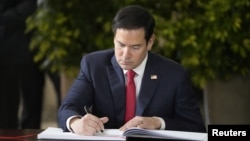The Trump Administration’s decision to pause and review United States’ foreign assistance programs and to restructure the U.S. Agency for International Development has raised a question about future U.S. commitment to foreign assistance. USAID is the government’s primary aid agency, estimated to have distributed over $43 billion dollars in aid in 2023.
Secretary of State Marco Rubio, who has been put in charge of USAID, emphasized that the change to USAID “is not about ending foreign aid.”
“It’s about structuring it in a way that furthers the national interest of the United States.”
Secretary Rubio noted that the statute that created USAID made clear that the agency is to take direction from the President, the National Security Council, and the Secretary of State; and yet, over the last two decades, USAID has failed to do so:
“Our preference was to go into USAID and work from the top down in identifying all of our programs. What are all the programs we fund around the world? ... Which are the ones that align us with the foreign policy of the United States? And which are the ones that we should not be involved in?”
Such review and oversight are owed to the American taxpayers, Secretary Rubio said:
“These are not private funds. This is American taxpayer funds, and we have an obligation to spend [them] wisely. ... Some of that money could be freed up to be spent - even more money - on the real priorities by repurposing it. That was our hope.”
Unfortunately, USAID was not cooperative, said Secretary Rubio, unlike the State Department:
“At the State Department, our program officers, we got a really good insight, and that is why every single day we are issuing waivers [to continue humanitarian aid] on State Department programs.”
In contrast, Secretary Rubio observed, there were individuals at USAID “even after orders were issued, that were still trying to push payments through, in contravention and in direct insubordination.”
The State Department is now openly engaging missions all over the world that have a USAID presence to identify which aid programs align with U.S. interests.
Those that do, will be preserved, said Secretary Rubio, “because they further our national interest, because they make us stronger ... and create prosperity – and not just for us but for our partners and allies.”






